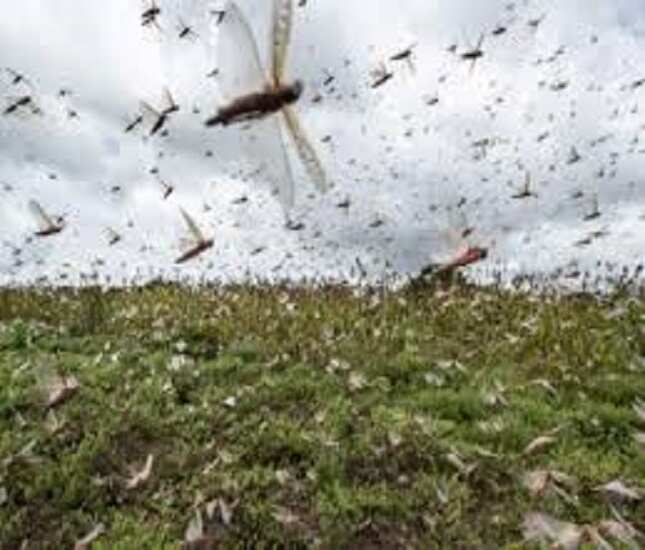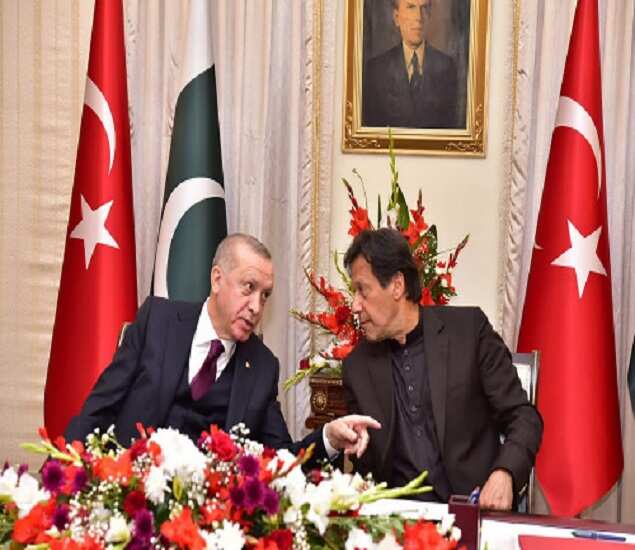Pakistan weekly round-up: Hafiz Saeed sentenced to 11 years in jail, Erdogan rakes up Kashmir issue & more

NEW DELHI: The upcoming Financial Action Task Force (FATF) meet hogged the headlines in Pakistan last week. The sentencing of terrorist Hafiz Saeed, the visit of Turkey's president and the prevailing locust menace, which has destroyed millions of hectares of crop, were other issues that made news across the border.
Here is your weekly Pakistan round-up:
1 
India and Pakistan have barely been on talking terms but the two countries have held five meetings unmarred by differences in the past few months to deal with a common enemy - the deadly desert locust.
This liaison will continue as there is a forecast of bigger invasion of “greater magnitude” from June this year than witnessed in 2019 when farmers of certain districts in Rajasthan and Gujarat faced damage to their standing crops.
The administration in Pakistan has formed 128 teams to control locust attack on crops in the country. The country is also expected to receive help from the World Food Organisation to eradicate locust. Several national and international organisations, Pakistan Army and National Disaster Management Authority have taken part in the operation to control the locust menace. Earlier this month, Islamabad had declared a national emergency to combat swarms of desert locusts.
In India, the crops over thousands of hectares in Rajasthan have been destroyed by locusts in the last few months. The western districts of the state bordering Pakistan have been the worst affected.
India & Pakistan talk terror of another kind

India and Pakistan have barely been on talking terms but the two countries have held five meetings unmarred by differences in the past few months to deal with a common enemy - the deadly desert locust.
This liaison will continue as there is a forecast of bigger invasion of “greater magnitude” from June this year than witnessed in 2019 when farmers of certain districts in Rajasthan and Gujarat faced damage to their standing crops.
The administration in Pakistan has formed 128 teams to control locust attack on crops in the country. The country is also expected to receive help from the World Food Organisation to eradicate locust. Several national and international organisations, Pakistan Army and National Disaster Management Authority have taken part in the operation to control the locust menace. Earlier this month, Islamabad had declared a national emergency to combat swarms of desert locusts.
In India, the crops over thousands of hectares in Rajasthan have been destroyed by locusts in the last few months. The western districts of the state bordering Pakistan have been the worst affected.
2
Pakistan court sentences Hafiz Saeed to 11 years in jail in terror financing cases
Hafiz Saeed, the mastermind of the 2008 Mumbai attack and Jamat-ud-Dawa chief, was sentenced to 11 years in two terror financing cases on Wednesday, four days ahead of a crucial meeting of the Financial Action Task Force in Paris where Pakistan will present its case to escape from being blacklisted.
Saeed, a UN designated terrorist whom the US has placed a $10 million bounty on, was arrested on July 17 in the terror financing cases. The 70-year-old fiery cleric is lodged at the high-security Kot Lakhpat jail here.
Saeed and his close aide Zafar Iqbal were sentenced to five and a half years each and fined Rs 15,000 in each case. A total of 11 years sentence will run concurrently.
Saeed, a UN designated terrorist whom the US has placed a $10 million bounty on, was arrested on July 17 in the terror financing cases. The 70-year-old fiery cleric is lodged at the high-security Kot Lakhpat jail here.
Saeed and his close aide Zafar Iqbal were sentenced to five and a half years each and fined Rs 15,000 in each case. A total of 11 years sentence will run concurrently.
3
FATF meet: Can Pakistan ward off getting blacklisted?
Pakistan, which has been grey-listed by the Financial Action Task Force over funding terrorism, will now have to submit its compliance report to the International Co-operation Review Group. Formed in 2007, the FATF's ICRG has analysed high-risk jurisdiction and recommended specific action to address terror financing risks emanating from them.
The global terror financing watchdog will this week, starting Sunday, evaluate whether Pakistan has taken sufficient steps and implemented its plan of action to fight the global menace or not. Pakistan will be submitting a report on action regarding the implementation of the watchdog's plan of action during the Paris meeting.
The FATF in 2018 placed Pakistan on the grey list and the watchdog has already granted Islamabad an extension till February 2020 during a meeting in October last year.
The body warned that Islamabad would be put on the blacklist if it did not comply with the remaining 22 out of 27 points related to anti-money laundering and counter-terrorist financing.
The global terror financing watchdog will this week, starting Sunday, evaluate whether Pakistan has taken sufficient steps and implemented its plan of action to fight the global menace or not. Pakistan will be submitting a report on action regarding the implementation of the watchdog's plan of action during the Paris meeting.
The FATF in 2018 placed Pakistan on the grey list and the watchdog has already granted Islamabad an extension till February 2020 during a meeting in October last year.
The body warned that Islamabad would be put on the blacklist if it did not comply with the remaining 22 out of 27 points related to anti-money laundering and counter-terrorist financing.
4 
Pakistan government has introduced several new measures targeting social media platforms. According to a draft of the law, the new measures announced earlier this week would pave the way for allowing Pakistani authorities to ask for the removal of content, disable encryption, and demand companies open offices and host data centres inside the country.
The new measures have been slammed by a leading media rights watchdog has slammed new regulatory measures in Pakistan where the media have been subjected to growing censorship and pressure following the election of Prime Minister Imran Khan in 2018.
Companies that do not comply with the rules risk being blocked online.
The new rules on social media are described by the authors as intended to prevent live streaming of online content relating to "terrorism, extremism, hate speech, defamation, fake news, incitement to violence and national security."
Pakistan introduces new measures targeting social media

Pakistan government has introduced several new measures targeting social media platforms. According to a draft of the law, the new measures announced earlier this week would pave the way for allowing Pakistani authorities to ask for the removal of content, disable encryption, and demand companies open offices and host data centres inside the country.
The new measures have been slammed by a leading media rights watchdog has slammed new regulatory measures in Pakistan where the media have been subjected to growing censorship and pressure following the election of Prime Minister Imran Khan in 2018.
Companies that do not comply with the rules risk being blocked online.
The new rules on social media are described by the authors as intended to prevent live streaming of online content relating to "terrorism, extremism, hate speech, defamation, fake news, incitement to violence and national security."
5 
Notwithstanding India's objection, Turkish President Recep Tayyip Erdogan on Friday once again raked up the Kashmir issue, vowing that Ankara will support Pakistan's stand as it is a matter of concern to both the countries.
Addressing a joint session of Pakistan's Parliament, Erdogan, who arrived here on a two-day visit, voiced his country's support to Pakistan's stand on the Kashmir issue, saying it can be resolved not through conflict or oppression but on the basis of justice and fairness.
"Our Kashmiri brothers and sisters have suffered from inconveniences for decades and these sufferings have become graver due to unilateral steps taken in recent times," Erdogan said, apparently referring to India revoking the special status of Jammu and Kashmir in August last year.
"Today, the issue of Kashmir is as close to us as it is to you (Pakistanis).
"Such a solution (on the basis of justice and fairness) will serve the interests of all parties concerned. Turkey will continue to stand by justice, peace and dialogue in the resolution of the Kashmir issue," the president said.
The Turkish President, in his address, likened the "struggle" of the Kashmiris with that of his country in World War I against foreign domination.
India criticised Erdogan's comments on Kashmir and asked him not to interfere in its internal affairs.
In Pakistan, Turkey's Erdogan says Kashmir is 'as close to us as it is to you'

Notwithstanding India's objection, Turkish President Recep Tayyip Erdogan on Friday once again raked up the Kashmir issue, vowing that Ankara will support Pakistan's stand as it is a matter of concern to both the countries.
Addressing a joint session of Pakistan's Parliament, Erdogan, who arrived here on a two-day visit, voiced his country's support to Pakistan's stand on the Kashmir issue, saying it can be resolved not through conflict or oppression but on the basis of justice and fairness.
"Our Kashmiri brothers and sisters have suffered from inconveniences for decades and these sufferings have become graver due to unilateral steps taken in recent times," Erdogan said, apparently referring to India revoking the special status of Jammu and Kashmir in August last year.
"Today, the issue of Kashmir is as close to us as it is to you (Pakistanis).
"Such a solution (on the basis of justice and fairness) will serve the interests of all parties concerned. Turkey will continue to stand by justice, peace and dialogue in the resolution of the Kashmir issue," the president said.
The Turkish President, in his address, likened the "struggle" of the Kashmiris with that of his country in World War I against foreign domination.
India criticised Erdogan's comments on Kashmir and asked him not to interfere in its internal affairs.
Download The Times of India News App for Latest India News.
more from times of india news
Get the app









